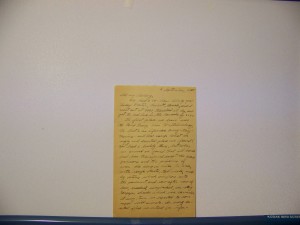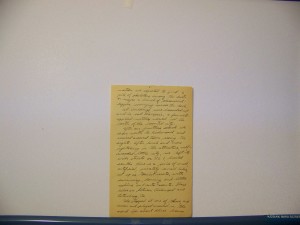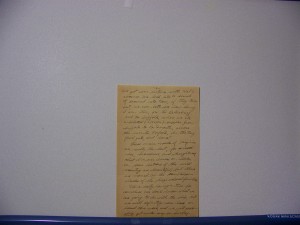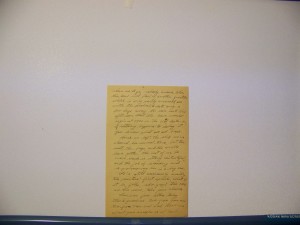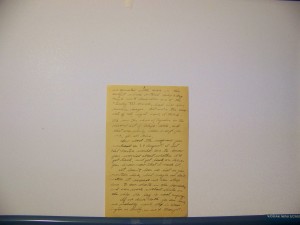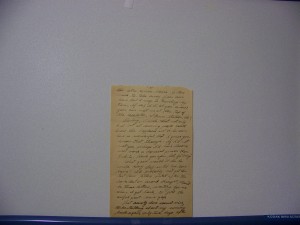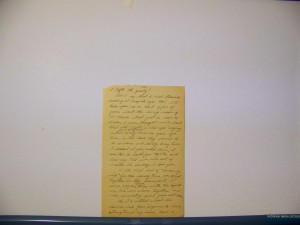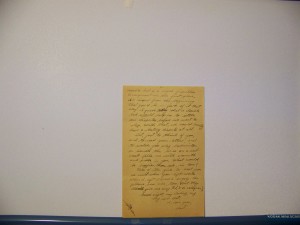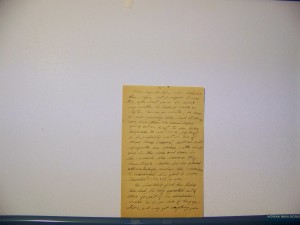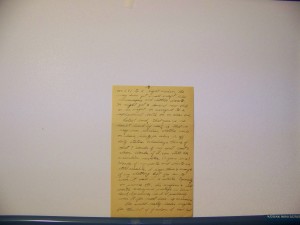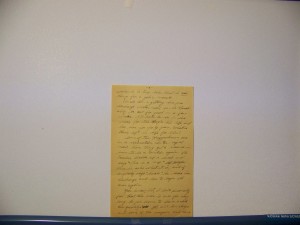With his relatively leisure schedule and a total lack of censors imploring him to curtail his writing, Dart is free to write long letters these days. Today’s offering is a whopping 11 pages!
He begins by describing a trip to Camp Peary near Williamsburg. In the usual Dart style, he practically takes the reader on a tour of this desolate place. “It’s an infamous Army-Navy-Marines-and P.W. camp. What an ugly and deserted place we found! Hal had a buddy there, but when we arrived, we found that all hands had been transferred except the guard garrisons and the prisoners of war. The camp is miles in area, with rough streets, tall weeds, muddy ditches which overflow onto the pavement, and row after row of low, crooked, swaybacked, one story tarpaper shacks which were barracks. At every turn we expected to come across wild animals. In every deserted office we entered for information we expected to find a pile of skeletons among the dust. All buildings were boarded up and in sad disrepair. A few well-applied matches would rid the earth of this haunted city.”
Later, the gang drove north to Richmond and explored the pretty, well-wooded city. They had lunch, looked around some more, and then headed south on US 1. Between Richmond and Petersburg they discovered a “series of small, artificial, privately-owned lakes set up as tourist resorts, with swimming, dancing, and little cabins and auto-courts.” After relaxing and swimming for a few hous at one of the lakes, they piled back into Hal’s car and continued on to Petersburg and Suffolk. Dart writes that they took a few pictures of themselves playing on the beach, which he’ll send on to Dot if they turn out.
After a late dinner in Suffolk, they returned “home” to the Navy yard. They covered a lot of territory in the 13 hours they were gone, and Dart loved every minute of the exploration. He loved the wide, smooth roads of Virginia rimmed by wild, wooded countryside. He noted that the beauty was marred only by the “tumbledown shacks of the huge colored families.” Yes, I also find it unsettling to see, first hand, the ravages of poverty.
There’s still no indication what will become of their ship, but the crew expects to move back on board this week, and possibly get her underway to a new location. He’s not happy about the prospect of living on a ship again. Although they’ve been cleaning, scrubbing and disinfecting the old girl nearly constantly since they arrived in Norfolk, the rust, the bugs and the smells have proved relentless. The environment is”distasteful” and the job of re-loading and re-provisioning the Haggard is huge. Naturally, Dart’s hoping his leave will begin in time to spare him some of that.
His mail today brought the news of Dot’s acceptance at Kent. He also got letters from his parents, written after Burke’s post-boot camp leave. Helen reports that Burke is more talkative, but doesn’t really say much more than that. Less than 24-hours after returning from leave, he was sent on a large draft to San Pedro, California. From there, Dart’s unsure of where he’ll go or what kind of work he’ll be assigned to do.
Dart’s happy about the latest news that sailors can now wear civilian clothes while on liberty or leave. He’s hopeful that some of his pre-war duds are fit to wear. He also hopes he’ll remember how to tie a civilian necktie.
He confides, “The world really looks brighter for the bit of freedom I has last weekend. A trip like that is the thing for a gob’s morale!”
He reports that his Uncle Tom is preparing to retire from the Navy after 40 years. Dart would hate to be in his uncle’s shoes, because with no wife or children, and no other interests, what’s left of his life, which has been 100% Navy for decades?
Then Dart switches gears. He expresses a concern that he’s uneasy about the permanence of the war’s end. It feels too abrupt to him, and he knows of some warships that are still on patrol in the Pacific. Did he have an inkling about the Korean War?
Back to one of Dot’s recent letters, he writes, “Darling, I wish that not only Fred but all deserving people could know the happiness we’ve known. Love is wonderful, Dot. I guess you know that, though. If I’d not met you, perhaps I’d have become an even worse depressed person than Fred is. Thank you again, Dot, for ‘being.'”
He likes her plan to write every day until they’re together. Even though he wouldn’t get the last few letters she wrote, they’d be waiting for him when he returns from leave. That’d help fill the painful gap of separation from her.
It’s a date! He’ll be happy to meet up with her on the couch at 115 Mason Street, Greenwich, Connecticut and stare into her eyes all evening. “I surely remember your eyes. Even in the dark they seem to be so warm and lovely. Every time I looked at you and at them, I wanted to hold you tighter and kiss you ’til we were out of breath. Oh Darling, how I love you!”
By the way, he likes it when they darken the room as they sit on the davenport. It feels cozier than with the bright lights on. “We seem closer together and more completely apart from all else.” Such a romantic, this guy!
He’s glad she’s come around to the idea of double beds. (I doubt it took much convincing.) He’ll consider the matter settled for good.
“Dot, just to think of you, and to read your letters, and to watch you play badminton or handle the lines on a sailboat fills me with warmth and pride in you. What could be happier than we, in love?”
Well, I’m pretty happy all these years later getting to read about that love as it grow, blossoms and takes root.
